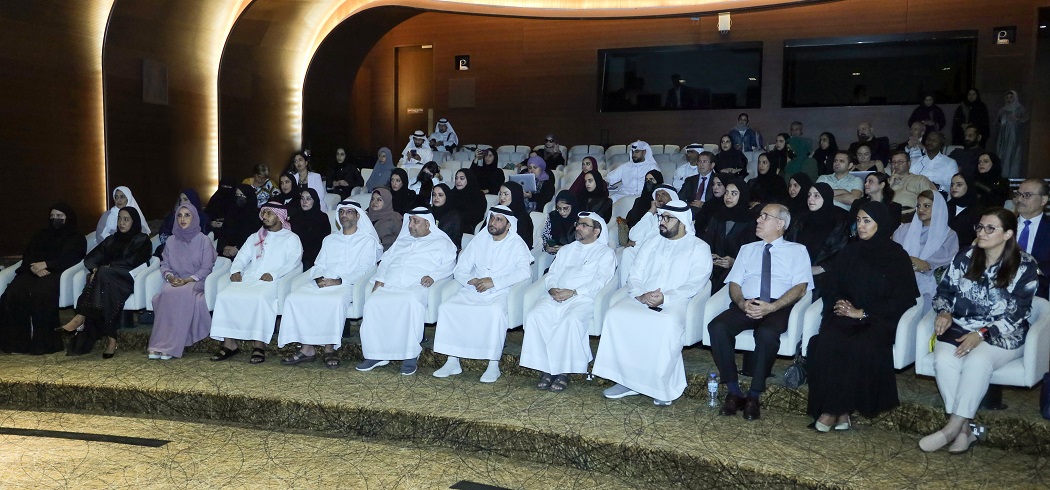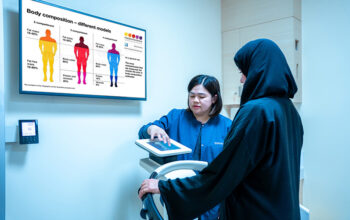- 22 government and private entities, strategic partners take part in the launch
- The national strategy lays out roadmap to develop sustainable healthy food systems
- MoHAP to establish supportive healthy food environments and promote healthy food choices
- The strategy focuses on improving nutrition data according to indicators and standards
- MoHAP Minister: The new strategy serves as integrated road map to develop a healthy food system in sustainable ways.
Dubai November 28,2022:
The Ministry of Health and Prevention (MoHAP) has launched a National Nutrition Strategy 2022-2030 to establish sustainable nutritional systems, provide safe and supportive nutritional environments at all ages, and strengthen food governance. The Ministry has also launched the strategy’s operational plan.
This comes as part of MoHAP’s ongoing efforts to support the UAE’s visions aimed at improving the health of younger generations, achieving food security, and raising the quality of life and its sustainability.
The strategy was launched during an event hosted by the ministry at the Etihad Museum. Salem Al Darmaki, Advisor to the Minister of Health and Prevention, and Nouf Khamis Al Ali, Director of the Health Promotion Department at MoHAP, were present.
Also taking part in the launch were representatives of 22 government and private entities, including strategic partners from various sectors, such as health, education, municipalities, trade, industry, agriculture, economy and the food industry.
The strategy has five more strategic targets, including: developing sustainable and flexible food systems for healthy diets, providing health systems and comprehensive coverage of basic nutrition measures, offering social protection and nutrition education, providing safe and supportive environments for nutrition at all ages, and following an advanced food strategy.
Participatory Approach
Speaking on the occasion, HE Abdulrahman bin Mohamed Al Owais, Minister of Health and Prevention, emphasized that the National Nutrition Strategy lays out a comprehensive road map for the development of a healthy food system based on sustainable practices and a participatory approach that incorporates a broad range of strategic partners. The minister stated, “We look forward to achieving the healthy nutrition goals for all sectors of society through this plan while also delivering health care services of top-notch quality.”
Al Owais added that the ministry’s collaboration with numerous stakeholders in putting the strategy into practice will help achieve the long-term objectives of creating a sustainable health system and enhancing the nutritional status of society, in a way that ensures the health and well-being of individuals as well as families and upgrades the sustainable development of our society as a whole.
“MoHAP is committed to implementing the strategy in collaboration with other stakeholders, using clear coordination channels, and basing all policies on the “One Health” concept. We will make every possible effort to decrease the prevalence of diseases connected to lifestyle and enhance the results of national health indicators. Driven by the National Strategy for Wellbeing and “We the UAE 2031” Strategy, the strategy would help improve data based on specific criteria for monitoring progress and evaluating results, the minister said.
Developing Food Health System
For his part, HE Dr Hussain Abdul Rahman Al Rand, Assistant Undersecretary for the Public Health Sector, emphasized that the National Nutrition Strategy was designed to complement other strategies launched by the UAE to improve the nutritional situation, including; the National Food Security Strategy 2051, National Strategy for Wellbeing 2031, the Global Goals for Noncommunicable Diseases 2025, the Global Nutrition Goals 2025 and the Sustainable Development Goals 2030, in addition to the national framework to combat obesity in the UAE and the National Guidelines for Preconception Care.
The implementation of this strategy will certainly lead to bolstering the health and well-being of the UAE people and future generations of all ages,” Al Rand noted.
This strategy and its action plan provide a framework for national efforts and will build on the progress made by the previous strategy 2017-2021. The new strategy will not only improve the UAE’s nutritional status, but will also help establish supportive healthy food environments and promote healthy food choices based on tried and tested solutions, the Assistant Undersecretary said.
Al Darmaki stressed that the overall objective is to provide a universal access to healthy and sustainable diets, and develop effective nutrition actions to improve nutrition for all age groups, including mothers, infants, children, adolescents, adults, and the elderly. This is in addition to preventing all forms of malnutrition and addressing diet-related risk factors.
Building on progress
Meanwhile, Nouf Khamis Al Ali underscored that the strategy will build on the progress made by previous strategies, programs and other complementary policies as it adopts data-based interventions and programs to create an environment conducive to good nutrition and develop implementation solutions for optimal infant and child nutrition.
The newly launched strategy will also help create healthier school settings and coordinate efforts to encourage healthy eating habits, thus supporting the federal strategy set to reduce childhood obesity and enhance maternal and child health, national guidelines for preconception care at the same time, Al Ali noted.
World Health Organization
Dr Ayoub Al Jawaldeh, Regional Adviser in Nutrition, WHO, lauded the ministry’s strategy, which according to him will improve the nutritional status of the UAE population. Launching this strategy reflects the commitment of the UAE health authorities and stakeholders to address nutritional challenges and achieve the World Health Assembly goals to reduce nutrition and non-communicable diseases and the sustainable development goals, especially Goals No. 2 and 3. The World Health Organization appreciates MoHAP’s high level of commitment to implementing the national action plan by improving health and food systems in coordination with high-profile actors.








